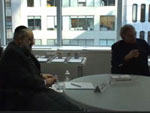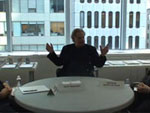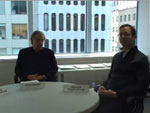Lawrence Schiffman: –progress. Of course there is an opposite Kabbalistic tradition which is the one that God popularized today on the determination that he could no longer — it doesn’t mean anymore what it used to be but what it used to mean was that over a period time through people doing its vote and doing good things then the world would progress to the point when the Messiah would come and that seems to be a pro-progress argument but then again much of the sort of Lithuanian Yeshiva type Jewish tradition always assumes the so-called [inaudible 0:28] that the generations will be getting worse which also has that fairness doctrine problem if we can call it that, but I was just thinking jokingly when you were talking that what would happen if Moses would have been able to use a computer or word processor when he was working on his honest work. I mean he was denied that opportunity.
David Birnbaum: So, I think we have a lot of points on the table. Since we have such, you know, high level players here I would like to spend a little bit focusing on what you agree what you state which I agree is a very key point here and that is according to Jew — classical Jewish theology God is eternal and according to many players in classic Greek philosophy God is eternal and I say that’s a fundamentally flawed metaphysics it’s a — it’s an incomplete metaphysics, it’s not metaphysics it’s theology. So if you want to theologically say God exists, fine, but don’t delude yourself this is metaphysics. Those are very key points, however I say you can have it all, you can have Jewish theology and you can have a metaphysics but you must say this is after several decades of thought on my part that Quest for Potential is the eternal spark and Quest for Potential is the core of the divine. So it’s a two step.
Lawrence Schiffman: But then where did that come from?
David Birnbaum: Okay so in my — in my — and that’s correct where did that come from, and in my humble thinking it’s easier to posit that a dynamic which I call Quest for Potential is eternal as opposed to the classic God of Israel. That’s from my perspective; it’s from my personal subjective perspective. At the same time I’d say that Quest for Potential at the core of divine one can finesse the two if one wants to and say they’re simultaneous. Quest for Potential that the God of Israel is simultaneously eternal but it’s clear in my mind the initial spark is this concept which I’m proposing Quest for Potential infinite power and I’ve of course I spent two books developing this theme. It’s hard to do it in one foot [inaudible 2:53] in this symposium, but yes correct that is the big hole which I find the classical Jewish metaphysics.
Lawrence Schiffman: No but you’re — you’re not answering the question where did the Quest for Potential come from?
David Birnbaum: Fair enough and I deal with that issue and I deal with that issue over the two lines. And, — and that’s what — that’s what metaphysics is all about, you know, I make the case over the course of two volumes in particularly over the course of the second volume. Now I could make a case that this Quest for Potential or Q4P shorthand Q4P is the eternal overriding, overarching cosmic spark and the question is, is this nonsense, is this narish type or is it the key — the key to the holy grail, that’s what this discussion is ultimately all about. That’s what Summa’s all about, is it narish nonsense, Birnbaum drunk up his omega force [ph] or does this truly seem to take us to another level of understanding of metaphysics. Now, no metaphysics in my humble opinion with all due reference to David Birnbaum can solve everything. In my humble opinion I won’t say it again humble opinion. The goal is to [inaudible 4:07] another level, there is another level of understanding, if we achieve that we achieve a lot. Why can’t we achieve everything because we are ultimately finite not withstanding our Jewish mothers’ opinion of ourselves and it’s hard for us to get our arms around the infinite especially if we are dealing with evolving infinite which is a more infinite at the end of the discussion than is at the beginning of the discussion or even more infinite by the time I finish this sentence than at the time I started the sentence and this is my goal, my goal is to strip away a layer of cosmic, it turns out — that it turns out to be very uplifting, why is that? Well to get to your points what is our goal, what is my goal, what is your goal. In my humble opinion our goal is to reach our individual potential. If you [inaudible 4:56] you have a different obligation to Quest of Potential than the person who is not so fortunate, okay.
Lawrence Schiffman: Assuming you’re right.
David Birnbaum: Assuming I’m right, maybe tired. Now, get back to your point, so the goal of a person born, you know, under the gun in the middle ages in a [inaudible 5:16] in the middle of nowhere has a different cosmic goal than the person like yourself, you know, possibly born in more gifted circumstances So there is a relativism in the Quest for Potential.
Lawrence Schiffman: Look, we can actually use [inaudible 5:29] time. If you take a look at somebody who’s born today in Afghanistan and somebody’s born today in New York and I think we sort of think the fairness argument seems to fall apart on some level when you just see that’s the way the world is.
David Birnbaum: Right, right.
Lawrence Schiffman: But unfortunately.
David Birnbaum: Right, and why is this theme potentially so powerful at Q4P, well because what it would seem to potentially elegantly finesse all these interrelated problems by one stroke of the mallet you crack all these interrelated problems, what are the origins of cosmos, what are the origins of divine, what’s the purpose of cosmos, what’s the purpose of divine, what’s the purpose of humankind and why is there — why is there evil if there is a divine and how we address all these individual questions of course I address them more frontline in the book but it’s one — it’s one stroke — it’s one hit potentially solving all the issues simultaneously. In my mindset, well this metaphysics may or may not be correct but it certainly seems to be elegant, it seems — it certainly seems to have reserved a place at the table. Now I’m not aware of any other metaphysics that which seems to finesse all these issues, it may exist but I’m not aware of it. If it exists someone should tell me where it is and still the same thing how is this possible, you’re saying that you’re the only guy who comes up with a elegant interrelated metaphysics in X thousand centuries, well my response is well that’s why I wrote the book because I could not find it. That’s my middle polemic for this portion of the symposium.
Lawrence Schiffman: Well the question of why there are no such inquiries is why the question I think because in reality most people gave up on this inquiry so that’s your problem.
David Birnbaum: And why did they give up on it?
Lawrence Schiffman: I think that they gave up on it partly in Jewish terms they gave up on it I think to a great extent because of the holocaust and I think they also gave up on it when [inaudible 7:36] replaced the evil period. There was a lecture about this by my teacher Alexander [inaudible 07:41] who in certain indirect manners is teacher you got this set of books for the — they are on his shelf all the time right, but he addressed this once in a conference and he basically explained that there was a shift from what was religious philosophy of the Jewish community to what they called Jewish philosophy which is really some form of thought and what happens is at the beginning with the rise of many of the modern thinkers they basically ran away leaving [inaudible 8:13] they ran away from the philosophic methods. Now there are lot of folks with philosophic method that you hinted at before that are fairly outdated because we don’t necessarily agree on the numbers based on certain scientific principles, we don’t agree to at all but that’s good reason to run away from it. But if you don’t substitute another one some kind or another then you have — it’s going to be the same one. Well we don’t know I can’t answer any of these questions, I think you get guys writing just their own opinion like why did people die in the holocaust, I can write whatever I want, right, because no discipline anymore. So I think that a systematic approach was lost by us in the transition from middle ages to modernity and there’s one other thing the orthodox part of the Jewish community which is so much of the best brain power, doesn’t bother with this stuff because philosophy is only at the intersection of the Jewish and the non-Jewish and the minute you think that the non-Jewish who cares what [inaudible 9:05] then you are not going to have time for this kind of thought. But I want to —
David Birnbaum: Well wait, wait, wait, wait, hold on I want everyone to focus very carefully what was just said. This is by the Chairman of Jewish Studies Department of NYU who said that Judaism or the Jewish academia [cross talk] okay, okay, okay you fill the blank, basically gave up on the systematic approach in modernity.
Lawrence Schiffman: I don’t know they gave up. They lost it in the transition to modernity.
David Birnbaum: They – let’s phrase you out.
Lawrence Schiffman: Yeah they lost it when they transition took place.
David Birnbaum: They lost it.
Lawrence Schiffman: Many things happened in the transition to modernity.
David Birnbaum: And roughly just for the audience, roughly what timeframe is that?
Lawrence Schiffman: Well I think it starts with maybe 15th, 16th century with [inaudible 9:59]. I think there are few holdovers [inaudible 10:04] trying to do the systematic type of thing like many non-Jewish will still do it.
Micah Gottlieb: He is not systematic.
David Birnbaum: Wait, wait, wait keep going, keep going and where [cross talk] okay, okay.
Lawrence Schiffman: You’re right because he’s already the [cross talk]
David Birnbaum: Don’t take risk, don’t take risk, modernity starts 15, 16 century through —
Lawrence Schiffman: I mean after Christ because I guess I think it’s probably fair to say the statement [inaudible 10:24]
David Birnbaum: Okay through — through the 18th 19th [cross talk]
Lawrence Schiffman: Yeah, yeah you gradually give it up.
David Birnbaum: It’s gradually giving up, right, okay this is very strong statement it’s a shocking statement, okay but that’s my perception, there’s not even attempt.
Micah Gottlieb: I just have one thing.
David Birnbaum: We are going to continue what you wanted to do.
Micah Gottlieb: I just had one thing to the reason why there might be this decline in metaphysics and that is this kind of — when some scholars talked about this kind of changing idea of knowledge of science and where science in the medieval and especially in the classical world there was this kind of contemplative ideal, philosophy trying to grasp the whole, the totality, the source, the beginning the first things. Well, what happens in the 16, 17, 18 century is there becomes a change in the view of knowledge and science takes on this very practical pragmatic dimension with what we now call technology and the service of technology and science is now about our control, controlling nature, and it’s about improving our life circumstances and in that sense what — and the idea is that what can — what can we really know — what we can really know is what we can create and things which we cannot create we cannot really know, and you see this expressed in Kant where basically he would say that, you know, this, you know, type of metaphysics, trying to understand the divine, well this is a noumenon this is something that we just have no idea about and Kant has a very strong impact within the Jewish community. So this becomes the goal of knowledge in some sense and goal of knowledge in science becomes much narrow, much lower, it’s about understanding nature, it’s about understanding in the service of controlling nature and there is a sense that our picture of science is always going to be changing, it’s a progressive picture, and that we’re going to discard previous models and move to new ones.
David Birnbaum: I find that metaphysics or academic metaphysics continually falls into the trap of trying to define everything, we define knowledge, we define understanding and if we define it it’s sort of locked into it whereas from my perspective once you keep it simple as if you’re speaking to this seven year old kid, don’t get too complicated with definitions.
For David Birnbaum philosophy, metaphysics, see also Davies1000





